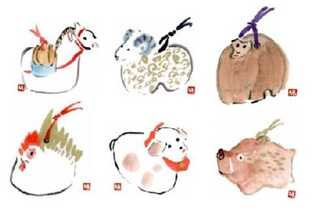干支(その3) - Year of Birth Animals - Part III
Girls born in the years of the tiger and the year of the white horse, are not desireable for wives. It is said that tiger-year wives often leave their husbands and go home. Whitehorse-year wives will destroy their husbands, according to ancient belief. In addition to the 12 animals and the five elements, which began in China, we also have periods of time called, DOYO.
トラ年と白馬の年に生まれた女性は、妻としてあまり好ましくないとされます。トラ年生まれの妻は夫を捨て実家に帰ってしまうといわれています。大昔の言い伝えによれば、白馬年生まれの妻は、夫を駄目にするといわれています。 中国から伝来した十干十二支のほかに、「土用」と呼ばれる季節があります。
The ancient Chinese said that the five elements (gogyo) controlled the seasons. Fire controlled summer, wood-spring, metal-autumn and water-winter. This left soil, which they said controlled the four DOYO. The exact time of the beginning of each doyo was fixed according to the sun longitude: Spring – 27°, summer – 117°, autumn – 207° and winter – 297°. Each DOYO is 18 or 19 days long and comes at the end of each season. These days, we think only of the summer DOYO, but the others are still there.
古代の中国では、季節の移り変わりは、木は春、火は夏、金は秋、水は冬というように、「五行(木、火、土、金、水)」の支配によるものと考えられていました。残った土は、年4回の土用を支配するとされました。土用が始まる時期は、太陽の経度によって正確に決まっています。春は27度、夏は117度、秋は207度、そして冬は297度です。各土用はだいたい18〜19日間で、季節の終わりにやってきます。近年は土用といえば夏しか思い浮かびませんが、もちろん現在でもほかの季節の土用は存在しています。
Farmers used the DOYO for deciding when to plant crops and, strange as it seems, the DOYO are based on science. The spring DOYO begins on April 17th (18 days) and the summer on July 20th (19 days). The autumn one starts on October 20th (18 days) and winter on January 18th (19 days). During the very hot summer DOYO (dog days), people eat eels on “cow’s day” to keep in good health. The weather on the third day of this season (doyo-saburo) also determines the quantity of the rice crop in the coming harvest.
昔の農家では、作物の植え付け時期を、土用を目安にして決めていました。意外に思われるかもしれませんが、土用というのは科学的なものなのです。春の土用は4月17日(18日間)、夏の土用は7月20日(19日間)、秋は10月20日(18日間)、冬は1月18日(19日間)にそれぞれ始まります。 夏の土用の「丑の日」に、人々は健康のためにウナギを食べます。また、夏の土用の3日目は「土用三郎」といい、その日の天気がこの秋の米の収穫量を左右します。
